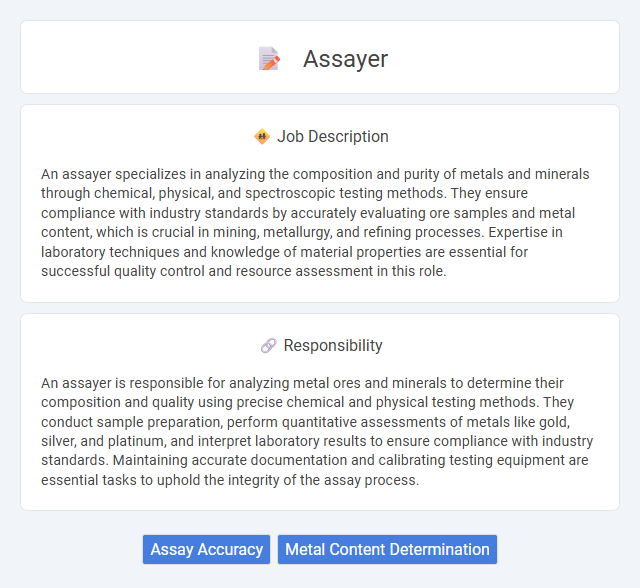
An assayer specializes in analyzing the composition and purity of metals and minerals through chemical, physical, and spectroscopic testing methods. They ensure compliance with industry standards by accurately evaluating ore samples and metal content, which is crucial in mining, metallurgy, and refining processes. Expertise in laboratory techniques and knowledge of material properties are essential for successful quality control and resource assessment in this role.
Individuals with strong analytical skills and attention to detail are likely to be well-suited for an assayer job, as the role requires precise measurement and evaluation of mineral content. Those who prefer repetitive tasks and can maintain concentration in a lab environment might find the work conditions favorable. However, people uncomfortable with handling chemicals or working in sometimes dusty or industrial settings may find this role less suitable.
Qualification
An Assayer typically requires a bachelor's degree in chemistry, metallurgy, geology, or materials science to accurately analyze and determine the composition of metal ores and minerals. Proficiency in laboratory techniques, such as spectroscopy and chemical analysis, alongside strong attention to detail, is essential for producing reliable assay reports. Industry certifications like Certified Assayer or specialized training in analytical instruments further enhance job qualifications and professional credibility.
Responsibility
An assayer is responsible for analyzing metal ores and minerals to determine their composition and quality using precise chemical and physical testing methods. They conduct sample preparation, perform quantitative assessments of metals like gold, silver, and platinum, and interpret laboratory results to ensure compliance with industry standards. Maintaining accurate documentation and calibrating testing equipment are essential tasks to uphold the integrity of the assay process.
Benefit
An Assayer's role likely offers significant benefits such as a chance to develop specialized skills in analyzing metals and minerals, which may lead to increased career stability in the mining and metallurgy industries. This position probably provides opportunities for hands-on laboratory work, enhancing technical expertise in quality control and material verification. Individuals in this role might also experience competitive salaries and potential for advancement due to the critical nature of their assessments in resource valuation.
Challenge
An assayer's job likely involves complex analytical challenges as they must accurately determine the composition and quality of metals and minerals in varied samples. Precision in chemical testing and data interpretation can pose ongoing difficulties due to the need for meticulous attention to detail and adherence to strict industry standards. Navigating unpredictable sample inconsistencies and maintaining laboratory safety protocols may also present continuous hurdles.
Career Advancement
An Assayer plays a critical role in analyzing the composition and quality of metals and minerals, providing essential data for mining and metallurgy industries. Career advancement often involves gaining expertise in advanced analytical techniques such as mass spectrometry and X-ray fluorescence, leading to senior roles like Lead Assayer or Laboratory Manager. Professionals with strong data interpretation skills and certifications in metallurgical analysis can progress into research and development or quality control management positions.
Key Terms
Assay Accuracy
Assayer job centers on precise chemical analysis to determine the composition and purity of metals, minerals, and ores, ensuring assay accuracy is critical for maintaining quality control in mining and metallurgy. Advanced techniques like fire assay and atomic absorption spectroscopy are employed to deliver reliable, reproducible results that meet industry standards and regulatory requirements. High assay accuracy minimizes financial risks by preventing errors in valuation and supports decision-making in resource extraction and processing.
Metal Content Determination
An assayer specializes in metal content determination by analyzing ore, metal, and mineral samples to accurately quantify precious and base metals such as gold, silver, copper, and platinum. Utilizing techniques like fire assay, atomic absorption spectroscopy, and inductively coupled plasma mass spectrometry (ICP-MS), assayers ensure the precise measurement of metal concentrations essential for mining, refining, and financial valuation. Accurate metal content determination directly impacts resource estimation, extraction efficiency, and market pricing in the metallurgical and mining industries.
 kuljobs.com
kuljobs.com